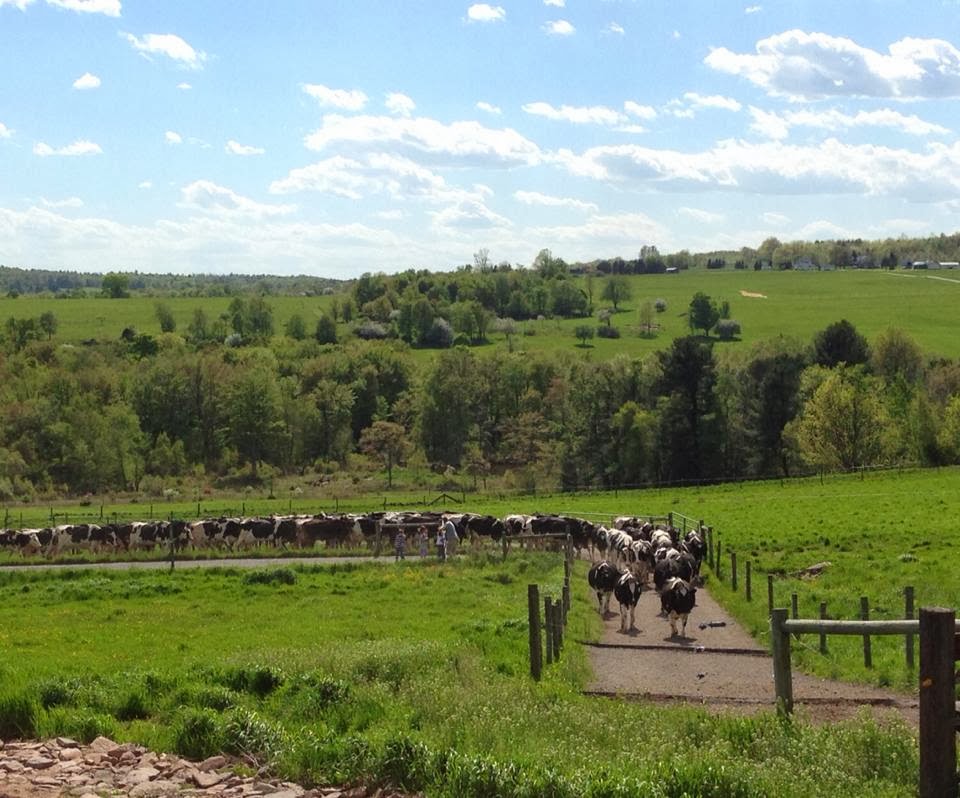Cheese is a pillar of French cuisine and no stranger to our kitchen. Not only do we offer a three or five variety cheese plate, but we tend to incorporate this fermented element into our dishes, the exquisite beet terrine, for example. And when it comes to choosing cheese, qualité is the only thing on our mind.
We source from a variety of dairies in the United States, places that have recaptured the traditional creamery and art of cheese making. Today we shine the spotlight on Calkins Creamery.
Since 1841, Highland Farm has nestled in the rolling hills of Wayne County, Pennsylvania. It's 260 pristine acres hosts vibrant grasses, a rolling stream, and, since the 1880s, the Bryant family. Their dairy consists of genuine Holstein dairy cows grazing happily in between sleep and milking.
In 2006, daughter Emily founded Calkins Creamery on the farm, utilizing skills of artisan cheese making from courses in California and Pennsylvania. They make over a dozen varieties of cheese, some that are fresh and pasteurized--like the Georgic found in our beet terrine--and the rest are raw, aged cheeses--like the Daisy, a cave-aged Tomme.
The caves are located on the property of a nearby winery, which reflects the traditional practices of agricultural life. The cave lends the perfect climate for aging.
But the cheese isn't just in the technique, the most important factor is the milk, and the Highland Farm milk is excellent. The secret is simple: calm, laid-back cows. "Cow comfort reduces stress and results in an increase of milk production and butterfat resulting in a higher quality product" says Emily. These Holsteins enjoy the outdoors, tidy stalls, fresh grasses, and clean water. Their environment couldn't be more pure.
The Bryant family utilizes several responsible farming practices to ensure longevity and environmental cleanliness. This includes using recycled newspaper and other recycled paper products for cow bedding, which, once soiled and put out to the fields, soaks up additional moisture reducing run-off. A Riparian buffer, orchestrated with help from CREP (Conservation Reserve Enhancement Program), protects the aforementioned stream, which uses fencing to keep the cows from eroding the banks, and trees, which soak up extra nitrogen before it enters the water tables and provides cooling shade to encourage robust marine life. Recently, the farm was also incorporated into the Wayne County Agricultural Land Preservation Program, which ensures that the land will never be subdivided for housing or any other purpose.
Just 88 miles from New York City, this farm offers us and our guests delicious artisan cheese that also supports it's environment and community.

We source from a variety of dairies in the United States, places that have recaptured the traditional creamery and art of cheese making. Today we shine the spotlight on Calkins Creamery.
Since 1841, Highland Farm has nestled in the rolling hills of Wayne County, Pennsylvania. It's 260 pristine acres hosts vibrant grasses, a rolling stream, and, since the 1880s, the Bryant family. Their dairy consists of genuine Holstein dairy cows grazing happily in between sleep and milking.
In 2006, daughter Emily founded Calkins Creamery on the farm, utilizing skills of artisan cheese making from courses in California and Pennsylvania. They make over a dozen varieties of cheese, some that are fresh and pasteurized--like the Georgic found in our beet terrine--and the rest are raw, aged cheeses--like the Daisy, a cave-aged Tomme.
The caves are located on the property of a nearby winery, which reflects the traditional practices of agricultural life. The cave lends the perfect climate for aging.
But the cheese isn't just in the technique, the most important factor is the milk, and the Highland Farm milk is excellent. The secret is simple: calm, laid-back cows. "Cow comfort reduces stress and results in an increase of milk production and butterfat resulting in a higher quality product" says Emily. These Holsteins enjoy the outdoors, tidy stalls, fresh grasses, and clean water. Their environment couldn't be more pure.
The Bryant family utilizes several responsible farming practices to ensure longevity and environmental cleanliness. This includes using recycled newspaper and other recycled paper products for cow bedding, which, once soiled and put out to the fields, soaks up additional moisture reducing run-off. A Riparian buffer, orchestrated with help from CREP (Conservation Reserve Enhancement Program), protects the aforementioned stream, which uses fencing to keep the cows from eroding the banks, and trees, which soak up extra nitrogen before it enters the water tables and provides cooling shade to encourage robust marine life. Recently, the farm was also incorporated into the Wayne County Agricultural Land Preservation Program, which ensures that the land will never be subdivided for housing or any other purpose.
Just 88 miles from New York City, this farm offers us and our guests delicious artisan cheese that also supports it's environment and community.





No comments:
Post a Comment